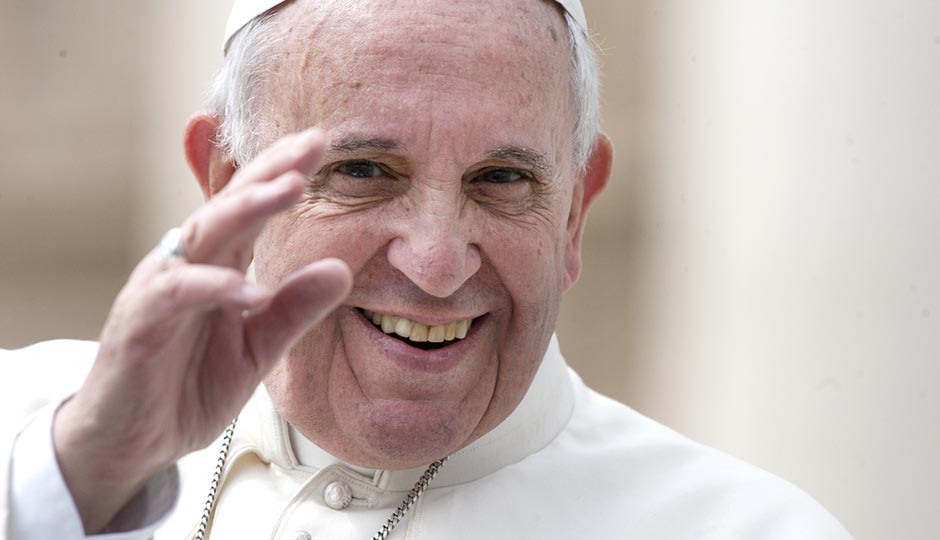The Brief: What Will Happen to the Homeless During the Pope’s Visit?

Pope Francis | Shutterstock.com.
1. Organizers say they are carefully considering the needs of homeless people as they make preparations for the Pope’s visit.
The gist: On Monday, Mayor Michael Nutter got in a physical confrontation with a homeless man who said that he was worried about the city’s plans to sweep the Benjamin Franklin Parkway of the homeless during Pope Francis’ visit in September. The Philadelphia Inquirer reports that organizers say that is not quite what will happen: Instead, everyone — including the homeless — will be required to leave the Parkway before the Pope arrives for security reasons, but then will be allowed back inside through gates. The World Meeting of Families has also formed a committee whose aim is “to protect the dignity and rights of people who are homeless, to make sure there is no detrimental treatment,” Project HOME’s Will O’Brien told the Inquirer.
Why it matters: There are reasons to be optimistic about how the city will treat homeless people during the Pope’s visit: Project HOME is a strong advocate for the homeless, and the group has a seat at the table. The Cool Pope has also welcomed and supported the homeless in various ways. But there is cause for concern, too. As the Inky reported, the homeless will be permitted to return to the Parkway after the security sweep “as part of the huge expected crowds.” That seems like it could be problematic. “Camping” will be forbidden on the Parkway during the Pope’s trip, too. It’s also unclear whether feeding programs will be allowed on the Parkway. And let’s not forget that Nutter tried to ban feeding the homeless on the Parkway a few years ago.
2. PHA might ban smoking in some of its units.
The gist: On Thursday, the Board of Commissioners for the Philadelphia Housing Authority will debate whether to ban smoking at some of its properties. Officials say it would be the biggest housing authority in the country to prohibit smoking, according to the Inquirer. A study by the U.S. Centers for Disease Control and Prevention “estimated that banning smoking in all government-subsidized housing units would save about $497 million in health-care and housing costs per year,” the Inky writes. It was unclear from the article how violators of the ban would be reprimanded.
Why it matters: Philadelphia’s smoking rate has recently fallen to an all-time low, and a smoking ban in PHA units could potentially make it drop even further. Giridhar Mallya, director of policy and planning for Philadelphia’s Department of Public Health, recently told Citified that he believes smoking has declined here partly because of the city’s ban on smoking in bars, restaurants and other areas. “Smoking bans not only protect people from secondhand smoke, but also give smokers an additional reason to quit,” he said. About 80,000 people live in the city’s public housing units.
3. Can Allan Domb solve the city’s tax delinquency problem?
The gist: Center City “Condo King” Allan Domb won the Democratic primary for City Council At-Large this May after promising to crack down on tax delinquents. PlanPhilly interviewed Domb about the specifics of his plan. He said he wants Philadelphia to do what New York does:
New York’s system is basically a sale of tax liens with outsourced collection, similar to what many other cities and counties do across the country, but with a few tweaks. The process works like this:
- Every year, the city identifies property-tax bills that amount to at least $1,000 and are at least three years overdue.
- It sets aside liens on properties owned by senior citizens, disabled people, veterans, and active military personnel.
- It transfers the rest to a trust established by the city.
- The trust bundles the most valuable liens, sells them as securitized debt, and pays the city upfront.
- The trust then contracts with private debt collectors to “service” the liens for a percentage of the debt they collect.
- After the trust collects enough money to pay back the investors who bought the bundled liens, it delivers the surplus back to the city.
Why it matters: Domb is more or less guaranteed to win the general election this fall. This is a taste of the plan he is likely to push for on City Council, and given that Council President Darrell Clarke is a big fan of tax lien sales, it has a good shot of winning support from his colleagues. Ultimately, though, it’s up to the administration to decide whether and how to sell additional tax liens. The city experimented with an online lien sale this June, which officials said was meant to test the waters for a larger auction in the future.
Connect with Citified
- Send tips to citified@phillymag.com.
- Sign up for the weekly Citified newsletter and never miss our best work.
- Follow us on Twitter @CitifiedPHL.
- Follow our writers on Twitter: @pkerkstra, @hollyotterbein, @malcolmburnley.